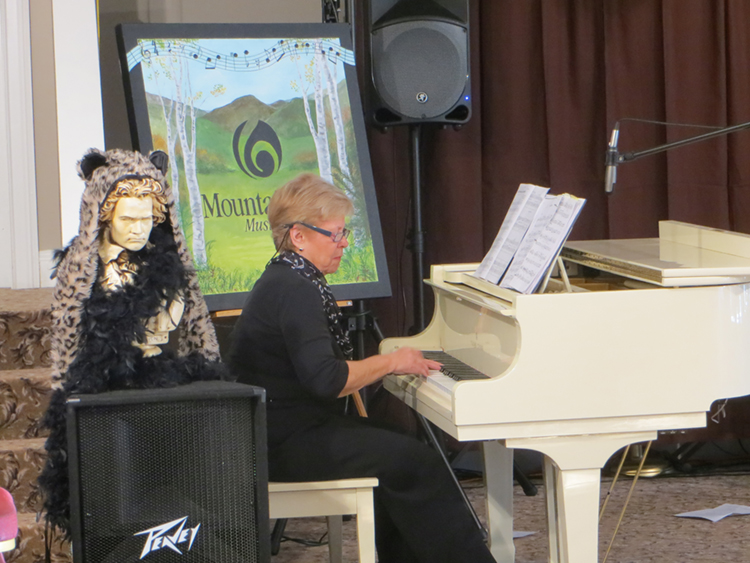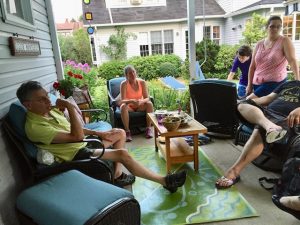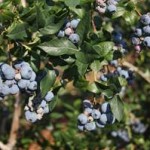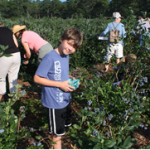In the spring of 2015, Judy Marshall Kennedy performed in a concert/recital after studying piano for a very short period. Judy, fill me in on the details. I love this photo, and I depend on Judy for inspiration!

In the spring of 2015, Judy Marshall Kennedy performed in a concert/recital after studying piano for a very short period. Judy, fill me in on the details. I love this photo, and I depend on Judy for inspiration!

Comments Off on Judy Plays
Posted in Performing
“Poem of the Moment” on the Mass Poetry website today, October 2, 2014, is Sandra Kohler’s Snowblind. What fun she is having, and lucky us!
Sunday morning, snow. An icy snow, thick,
crystalline. I sit in a white-lit room, looking
through white lace curtains at the white-draped
houses and cars and trees of Tonawanda
Street. The only sound the scrape, rasp of one
shovel, one shoveller. What is the language
for this white light, cold state, this steady fall
of winter: prison, embrace, beauty, blindness?
The house is soundless. A distant roar – truck
or plow. The freight of Sunday papers waiting,
their sections worlds: imagination, arts, sport;
war, bombings, concentration camps, terror.
All architecture is the architecture of desire:
what’s built from our wishes, dark or aspiring.
In today’s news, a Vatican statesman calls
Gaza a concentration camp, to Israeli outrage:
their blind claim to the moral high ground.
Is the claim always a sign of blindness?
I condemn Israel for bombing Gaza, while on
the Boston streets where I live young men are
shooting each other and I close my eyes, hope
not to be in the line of fire or ricochet.
The wind chime on the porch slowly stirs,
as if moved not by wind, but from within.
Across the street, a shadow’s shadow: crow,
black marker, is perched on the crest of
Miss Rose’s slanted roof, defining the line
between the white of snow, the white
of sky. Morning’s clear light is blinding,
unsparing. There’s nothing left to spare.

Sandra Kohler’s third collection of poems, Improbable Music,(Word Press) appeared in May, 2011. Earlier collections are The Country of Women (Calyx, 1995) and The Ceremonies of Longing, winner of the 2002 Associated Writing Programs Award Series in Poetry (University of Pittsburgh Press, 2003). Her poems have appeared in journals, including The New Republic, The Beloit Poetry Journal, Prairie Schooner, and many others over the past 35 years. A resident of Pennsylvania for most of her adult life, she moved to the Dorchester neighborhood of Boston in 2007.
Comments Off on Another success for Sandra Kohler
Posted in Literary
Published in the magazine “Ginosko, No 15” , by Sandra Kohler
The Name of Our Nature
The creek’s a blade of light that cuts
morning. I’m flat, blank. I’m afraid I’m
losing my subject: intense interactions
of the human heart. My head’s a chaos
of shreds and patches. I need a grandchild,
a roomer, an affair. I need to tie red
rags to my black suitcases so they signal
me from the carousels, wave brightly as
they fly by. I need bananas I need time,
an hour or two of a light that’s not broken,
breaking. Why do we love what scares us?
In my dream, it’s snakes: my son tries to
keep them away from me, but here they
slither, two long ones. He insists we kill
and eat the old dog that belongs to us.
Afterwards, I complain to my husband,
“who do you think actually had to do
the killing?” I will slay the old dog of
our sorrows and cook him to feed my son,
yet I won’t eat the flesh, consume what I
have prepared. I don’t believe a word I’m
saying but truth has nothing to do with
my assent or refusal. These tales will not
exist unless I invent them. It’s Heraclitus
I need here, for the right enigma. As I raise
the knife, the dream dog insists “you are
my sister.” I’m torn to pieces. Who shall
I play with, my son or the dog? How do
I choose, what do I turn to game that is
deadly earnest? What earnest can I give
of what my heart intends? The name
of our nature is longing.
Influx
Tuesday’s rain is so gray I need to turn on lights
in the morning kitchen. Tuesday after a holiday,
so Tuesday doubled with Monday meaning:
resumption of the routine, real. I come back up
to the bedroom where my husband’s sleeping, wrap
a blanket around me instead of a robe, stare out
at the wet green grayed world, remembering that
in my dream a tribe of children are visiting, I put
them all to bed in different places in the house,
makeshift arrangements, realize there’s an extra:
a baby abandoned not on my doorstep but in
my bedroom, bed. I take him in, wondering why
he turned up, whose he is, accepting his presence
as part of this influx of children, a new regime
in my life’s history. Outside, cars on wet roads,
the sound that’s woken me for a string of days,
continual, replicated: an iteration of Tuesdays.
The east’s layered mass, gray to muddy taupe,
heavy, fraught. A line of local geese goes over,
heading north. I am going to drink my coffee,
empty my bladder, put on different shoes
and an attitude in which I can walk and talk
like the ordinary gods. I am going to make do,
make love, make poems, make a life incisive
as the vee of geese that goes north as I write.
I am going to be ready for what day doesn’t
bring and unready for what it does.
Comments Off on Newly Published Poems, by Sandra Kohler
Posted in Literary
May, 2014, Liz Barrett
I spent last month making two vinyl rugs for our newly refurbished patio. We had some leftover vinyl from a renovated bathroom. I flipped the vinyl over, cut rugs to size, and painted the designs to go with our blue patio furniture (and green gardens and grass). I really don’t know whether or not this is going to work. I used house paint primer follow by latex house paint (you can’t get oil paints any longer). Then I topped them with a coat of MinWax poly urethane (oil base for durability). We’ll see how long they last and how well they resist wear. The rugs measure 3.5 x 5.5 (bottom) and 3.5 x 4.5 (top) for two conversation areas on the patio. When we get the patio all finished (with new throw cushions), I’ll include a photo of the whole thing.
5/2015 — We discovered that the rugs were scarily slippery when wet — not great for a patio beside our pool. Non-skid rubber spray worked marvelously well. 6/2017 Here’s a photo I found from 2015 — I have absolutely no idea who the people are nor the event. It doesn’t look like much fun, but the rugs look terrific. After three years they are still going strong.

Comments Off on Vinyl Rugs
Posted in Visual
Poem from Bette Keck Peterson, December 2013
Sandra Kohler (Sandy Iger) has three poems in the Fall, 2013 issue of Prairie Schooner, a fine old literary magazine. You can probably find copies at a good bookstore or library, or order a single copy from Prairie Schooner, 123 Andrews Hall, University of Nebraska, Lincoln, Nebraska 68588-0334.
[Ed. note: You were also able to read one of Sandy’s poems, “On My Seventieth Birthday I Try To Skinny-Dip in Boston Harbor” featured on the web site, Poetry Daily, on Sunday, September 29th, 2013. If you went to http://poems.com/ On that day only it was there to read.]
Meanwhile, she’s received permission from Prairie Schooner to post one of the other two poems, below, on the class website. (A gracious decision, since they don’t usually permit such publication for work in a current issue).
Gray Storm
A gray storm of a day: weather I’d usually
welcome, but this morning, after yesterday’s trip
to say goodbye to a dying woman, its bleakness
echoes, weighs. Overnight, email from a friend
who wonders if he needs a shrink, meds: tells me
during the days he’s full of joy, nights, dread.
This seems natural to me, in touch with reality.
Earlier this week the Times ran a front page piece
about how people all over, except in parts of
Europe and the United States, die in pain,
the excruciating pain of burns, AIDS, cancer
because morphine’s not available. It would take
a Dante to imagine this reality. At my dying
friend’s bed, what we speak of, like the souls
in hell, is former joy: our walks last summer
mornings through neglected gardens, fields,
old graveyards, abandoned campgrounds on
the island where she lived as a child; we talked
about plants, flowers, people; the families
we grew up in, our dead parents, married lives,
raising children: all that made us what we
were. Walking, these shards of our past, bathed
in the glancing sunlight, were lit by flashes of
discovery. Forgotten times, unfulfilled desires,
surfacing, float in the day’s shimmering
air, an island of joy in the dark river of what
was happening to her. That river’s crested:
caught in its flood, she seems not to belong
to this world: shrunken, swollen, her head nearly
a skull, her speech blurred, muffled. She will
not talk away a morning’s walk again, summer
or winter, with anyone. But her wry wit’s intact,
she’s struck by the black comedy of this agon:
the nurse insisting she has to have a shower when,
despite opiates, every movement’s torture. She suffers
most thinking of the pain hers is causing those who
love her: her husband, daughter, son. She’s neither
bitter nor afraid: a resignation which like her faith,
I cannot comprehend. We don’t talk of the future,
only our shared segment of the past. When
it’s time for leave-taking, all we can tell
each other is what we’ll miss: each other.
This poem originally appeared in Prairie Schooner’s Fall 2013 issue.
Comments Off on Poems
Tagged gray storm, Kohler, Prairie Schooner, Sandy
Had a great 2 month run as the Mother Abbess (Rev Mo, as the cast called me!) at the Candlelight Pavilion in Claremont, CA. Best cast I’ve ever worked with so I felt very blessed.
Comments Off on Kim Kimball Holmquist in Sound of Music, spring 2013
Posted in Performing
Tagged Kim, Sound of Music
IT’S THE BERRIES by Sue Wheatley Carr, August 2013
 The house that I grew up in was surrounded by blueberries…wild, low-bush in the front and cultivated, high-bush that my father had planted, in the back. Picking berries came soon after learning to walk.
The house that I grew up in was surrounded by blueberries…wild, low-bush in the front and cultivated, high-bush that my father had planted, in the back. Picking berries came soon after learning to walk.
One day in June, after school let out, when I was 7 or so, I trekked up the street at 7am with my big brother, Jack, to pick strawberries. George and Bessie Rounds had a strawberry farm, and kids of all ages picked berries in June, for 2 cents a quart – No, it wasn’t Oklahoma. His mother, Grandma Rounds, kept track of the pickers, telling us to “pick clean” and not to touch the berries because the electricity from our hands would ruin the flavor. I picked 9 ½ quarts that morning – not too bad for a little kid. Grandma Rounds counted out my berries and gave me 19c. There was no rounding off pay-checks, in her field.
Meanwhile, my brother was picking with our cousin, Russell, who was 11. He had on a magnificent white T-shirt. My brother picked a very red and very large strawberry, looked up and saw Russell’s beautiful white back. He let fly with the berry which landed “splat” in the middle of Russell’s back. Unfortunately, Mr. Rounds saw the whole performance and fired my brother on the spot. Jack felt he was fortunate not to have been attacked by Grandma Rounds and her cane.
A few years later, I went to summer camp for two weeks. I had such a good time, I begged to be allowed to return. My father said I could go back for the last week in August if I earned half of the $40.00 that it cost. So, I started picking blueberries at George Rounds’ blueberry patch. This was much easier than picking strawberries, even though they didn’t add up so fast. But, the best thing was that you would get 10 cents a box.
Picking berries brings out the chatty nature of people…So, I would talk to anyone who was close by. An older boy, probably 15 or so, was near me and I started in… Filled with thoughts of my return to camp, I said, “What are you going to do with the money you make?” His answer was, “I’m going to give it to my mother for rent.” Well, that stopped me in my tracks. My dreaming about camp suddenly seemed a little less worthy.
Picking every day for two weeks netted me $18.50. My father allowed as how that was enough of a contribution – and off I went, back to New Hampshire – happy but also a little wiser about other people and their lot in life.
Fast forward, 55 years. Today, I picked blueberries in a “pick-your-own” field.
 There were dozens of rows of cultivated blueberry bushes; a net that was strung over the whole field to keep out the birds; 75 or so people, all ages; and each pint cost $2.50. We were told that we could pick anywhere – No one admonished me to “pick clean”. I stood in front of a bush that was dripping with ripe berries – It took my breath away. It was like the first sip of a gin and tonic on a hot day. Grandparents and grandchildren were happily picking together…”Oh, that’s a wonderful box of blueberries”, “You’re a great picker”, etc. Encouragement and happy voices were everywhere.
There were dozens of rows of cultivated blueberry bushes; a net that was strung over the whole field to keep out the birds; 75 or so people, all ages; and each pint cost $2.50. We were told that we could pick anywhere – No one admonished me to “pick clean”. I stood in front of a bush that was dripping with ripe berries – It took my breath away. It was like the first sip of a gin and tonic on a hot day. Grandparents and grandchildren were happily picking together…”Oh, that’s a wonderful box of blueberries”, “You’re a great picker”, etc. Encouragement and happy voices were everywhere.
I picked just shy of 5 pints (in one hour!). When I went to have them measured, the owner said, “We won’t worry about the short pint. Ten dollars will be fine.” My! What a change!… From the “child labor” scene of yesteryear to the “on vacation” field of today.
Berry picking is a religion with me – perhaps because I started so young. But, then maybe it’s because of the wonderful conversations you have or overhear, or being able to cash in on nature’s bounty, or simply being part of a happy scene. Or perhaps it’s the important secrets you pick up…for instance: not everyone has had so easy a life as I have had; some people are scrimpy and others very generous – and which type is to be preferred; and what magnificent fruit is provided by the earth.
If only everyone could have a blueberry patch up the road…
Sue Carr Brewster July, 2012
Overheard July, 2013…
”What do you call a sad strawberry.”
“I don’t know, what?” –
“A blueberry!”
LATE AFTERNOON, by Dottie Smith Mann
This is where I am in my life…
the late afternoon
so full of beauty it cracks my heart.
A sharply defined beauty
nothing fuzzy about it
three dimensioned
the up close and the far away clearly etched
seen by the light of a strong but waning sun.
The evening will come
Let evening come, the poet said.
Not yet though
Let me have the flickering shadows
the wind tossed trees
the soft blue skies
the brllliant sun almost at eye level.
Let me have the distant sounds of a small plane
the workmen down the lane almost done for the week.
Let me have the sun on teak tables and leather chairs
my husband resting upstairs
the shining maple floor
the reflected light on Aunt Anne’s bird sculpture
reminding me of a window on Eden Road looking out to sea.
Oh it cracks my heart and from that space
I feel a current come
A river of joy and love and gratitude
That I am here
in the late afternoon
before the night.
You must be logged in to post a comment.